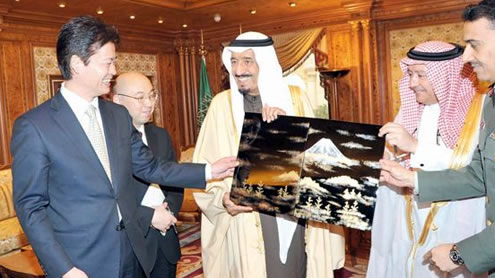 RIYADH: Saudi Arabia and Japan pledged to boost cooperation in the energy sector with a proposal to provide more oil to Tokyo in case of a shortage or supply disruptions following fresh sanctions imposed on Iran by the West.
RIYADH: Saudi Arabia and Japan pledged to boost cooperation in the energy sector with a proposal to provide more oil to Tokyo in case of a shortage or supply disruptions following fresh sanctions imposed on Iran by the West.
“Defense Minister Prince Salman and Minister of Petroleum and Mineral Resources Ali Al-Naimi held talks with Japanese Foreign Minister Koichiro Gemba and discussed bilateral and regional issues as well as ways and means to cooperate in energy sector,” Abdulaziz A. Turkistani, Saudi ambassador to Japan, said on Sunday. He said the talks between Prince Salman and Gemba “mainly focused on how to strengthen Saudi-Japanese relations further.”
Prince Salman, who last visited Japan in 1998, was also presented a plaque of appreciation by Gemba, said the envoy, adding that the talks were held in a “candid” atmosphere. “The talks with Al-Naimi were, of course, more on joint proposals, plans and projects in energy sector,” said Turkistani. He said the two sides also discussed the international oil prices, joint investments, exchange of expertise, and prospects of cooperation between oil producing and oil consuming countries. The talks with Al-Naimi, which was attended by Prince Abdulaziz bin Salman, assistant minister of petroleum and mineral resources, and other senior Saudi officials also focused on stability of oil prices in international markets and environmental issues.
Speaking to reporters in Riyadh, Masaru Sato, deputy spokesman for Japan’s Foreign Ministry, said the talks included “Iran’s nuclear ambitions and Saudi oil supplies.” According to the spokesman, Saudi Arabia supplies 30 percent of Japan’s oil imports, with another 20 percent coming from the United Arab Emirates, 10 percent from Qatar and nine percent from Iran. Fresh sanctions on Iran over its nuclear program could make it difficult for refineries in Japan, Iran’s No. 3 crude buyer, to pay Tehran for its oil. Pressure from Washington and the European Union to boycott Iranian oil is mounting at a time when Japan must make greater use of thermal power plants after a massive earthquake and tsunami sparked a nuclear power crisis last March. The vast majority of Japan’s 54 nuclear reactors are now shut down, amid public distrust of the technology and increased safety calls.
Sato said Al-Naimi and Gemba agreed that the “oil price stability is important amid concerns over a potential surge in crude prices as the United States and EU countries move to toughen sanctions against oil-producing Iran over its nuclear program.” Japan also aims to expand “its infrastructure-related exports” to the nations in the Middle East, mainly in the fields of solar and other renewable energy technologies. If nuclear reactors in Japan are not reactivated, demand for fuel for thermal power generation in fiscal year 2012 will reach 40.96 million kiloliters, three times the 2010 level. – Arabnews












